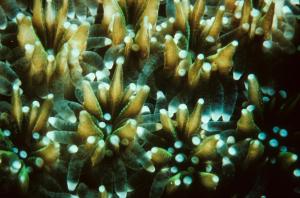(Coral polyps comprise a coral colony. Credit: Robert Richmond.)
By Staff Reports
(Oahu)– In a new study, released in the peer-reviewed journal Frontiers in Marine Science, a team of international researchers explore the frontiers in natural and social science research – recommending actions that have the potential to build stronger support for reef management and improve the efficacy of conservation efforts. The scientists identify ways to more accurately diagnose stressors affecting reef health, approaches to dealing with those stressors and, finally, the social and political factors in effective governance of coral reefs.
Coral reefs are an iconic marine ecosystem for their beauty and biodiversity. They also sustain a wealth of economic, cultural and ecosystem services including livelihoods, tourism, coastal protection and the provision of a secure food source for millions of people around the world. However, reefs are exposed to an array of threats, such as climate change, coastal development, pollution and overfishing. Many scientific studies have documented the impact of losing the world’s coral reefs – with estimates indicating that 200 million people globally could bear the costs of losing the valuable economic, cultural and ecological services corals provide.
“While emerging and additional research tools and results are of great value, we can’t afford to delay acting on what we already know,” said Robert Richmond, research professor and director at the UHM Kewalo Marine Laboratory, who has studied reefs for 42 years. “We understand the root causes of coral reef losses and the actions that must be undertaken today. We have solutions available to us now that can turn things around before it’s too late.”
Just like blood tests devised to assess the health of a person, molecular biomarkers are produced by stressed corals and can be utilized to diagnose the key classes of stressors and their relative effect on the health of coral reefs. Richmond and co-authors recommend making this powerful tool more broadly available including to developing areas where funding is limited.
Richmond and colleagues also address the complexities of dealing with local stressors on reefs and addressing the impacts of global climate change. With limited resources, managers must often prioritize the locations and timing of interventions. Past studies have shown that corals from marginal habitats may already have populations and genotypes that have elevated resilience and resistance to stressors.
“While there is the temptation for establishing and enforcing protection of reefs in pristine areas, the value of corals in marginal habitats should not be ignored,” the authors emphasize in the publication. “Such corals may end up making sizable contributions to the reefs of the future.”
Further, given the inevitability of future climate change impacts on reef ecosystems, the authors encourage exploring direct intervention strategies to maximize the survival of reef corals over the next few decades. For example, to capitalize on the natural resilience of some coral species, heat-tolerant corals can be identified, propagated and restored on affected reefs – a “gardening” approach.
Coral reef management and conservation will require both top-down and bottom-up interventions— and governments have a serious challenge in creating effective and genuine legislation to protect coral reefs. Richmond and co-authors indicate that much work remains to be done to engage properly and communicate with those closer to coral reefs, that is, those who are the significant drivers of change and who have a real stake in ensuring their future survival. These engagements will often require patience and the willingness to accept trade-offs between community livelihood needs and conservation and management goals. It will also require a strong emphasis on cross-generational environmental education and awareness while training local users and officials in reef monitoring and peer-to-peer enforcement frameworks.
“Even in the face of clear challenges, I remain optimistic about the future of coral reefs,” says Richmond. “I have witnessed full recovery of severely damaged reefs in Palau following the 1998 mass bleaching event, and the willingness of Palau’s leaders and stakeholders to actively reduce local sources of reef stress is a model that can work here in Hawaiʻi and elsewhere.”
The study was led by Shankar Aswani of Rhodes University and co-authored by other world-renowned biophysical and social scientists and Pew marine fellows at the University of Queensland, University of Miami, University of Washington, Great Barrier Reef Marine Park Authority, University of Maine, and University of Hawaiʻi at Mānoa.
Aswani S, Mumby PJ, Baker AC, Christie P, McCook LJ, Steneck RS, Richmond RH (2015). Scientific Frontiers in the Management of Coral Reefs. Frontiers in Marine Science, doi: 10.3389/fmars.2015.00050.

